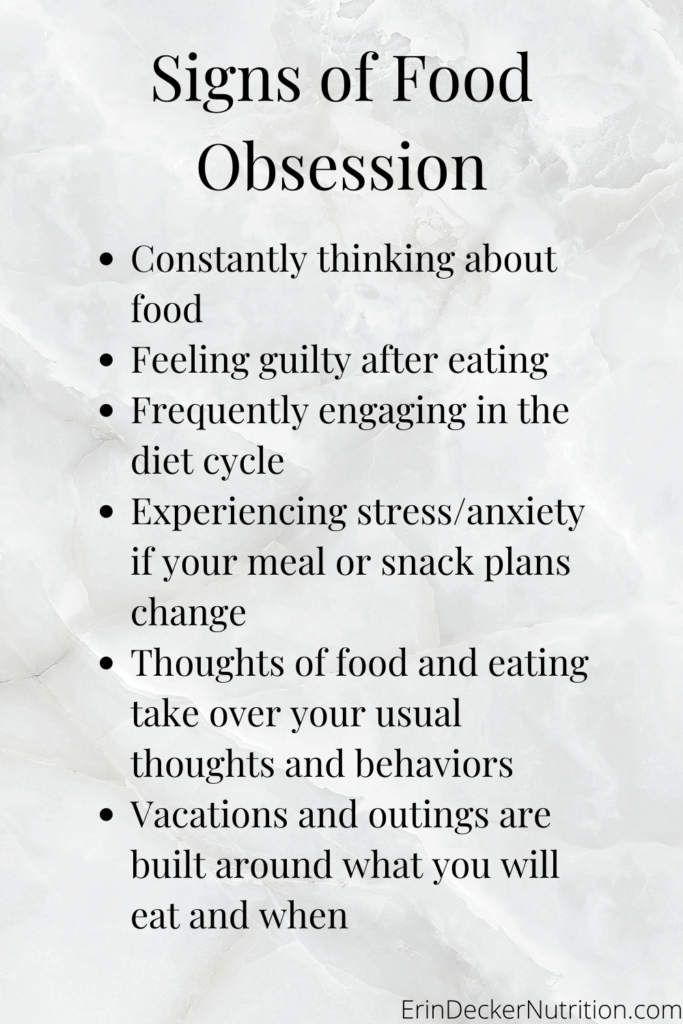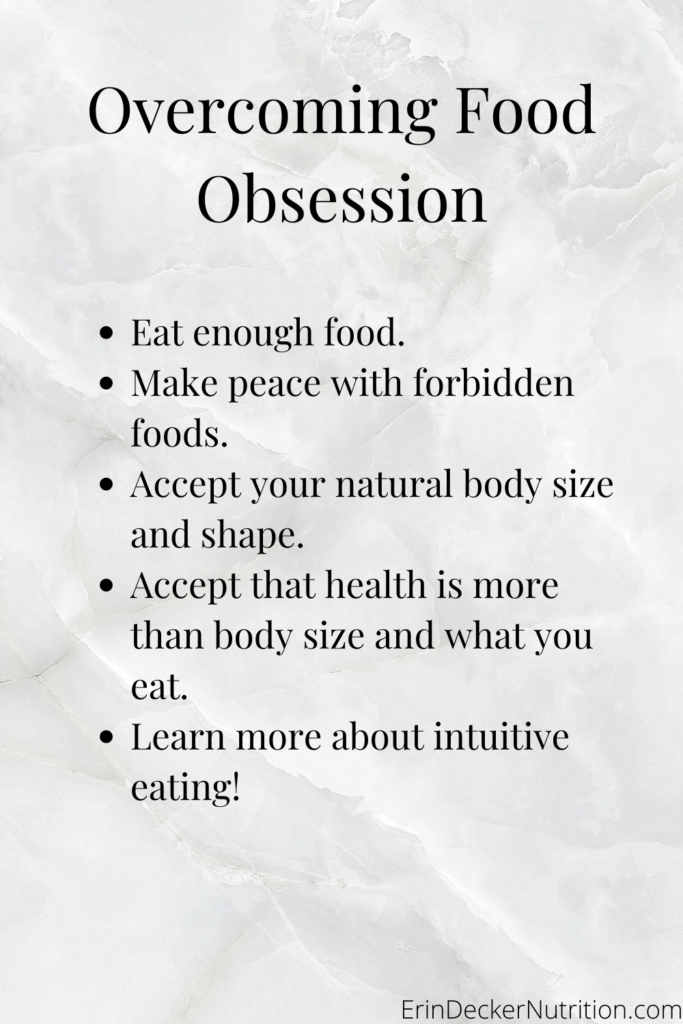What is Food Obsession
Food obsession is exactly what it sounds like – it is a constant thought and awareness of what you want to eat, what you are going to eat, what you have eaten, and even what others are eating.
It is like a hobby, yet it is taken to the extreme. Most people who are obsessed with food wish that they weren’t. It takes away the pleasure of enjoying other things in life.
Signs of Food Obsession
Some common signs of food obsession include:
- Constantly thinking about food
- Feeling guilty after eating
- Frequently engaging in the diet cycle
- Experiencing stress/anxiety if your meal or snack plans change
- Thoughts of food and eating take over your usual thoughts and behaviors
- Vacations and outings are built around what you will eat and when

What Causes Food Obsession
Food obsession is a type of disordered eating. In extreme cases, it can progress to a clinical eating disorder.
At a sub-clinical level, food obsession is often triggered by restriction. Restriction can be psychological or physiological. Restriction can happen at any body size.
This is evident in the classic Minnesota Starvation Experiment. In this experiment, healthy volunteers were subject to calorie restriction in order to study the effects of starvation on humans in order to learn how to “refeed” victims during World War II.
Throughout the experiment, participants gradually started to show signs of food obsession. They had trouble focusing on anything besides food. They were looking at photos of food, visiting bakeries at which they could not place an order, and manipulating their rations to make their portions look larger. Some would do extra exercise in order to “earn” a larger portion.
Side note: participants in this study were allotted 1800 calories per day, which is even MORE liberal than many diets today!
Physiological Restriction
The most common trigger for restriction is dieting. For some, this can start as early as age 10!
How does restriction trigger an obsession with food?
First and foremost, it makes you hungry. Most people struggle to make mindful eating decisions when they are ravenous. It is the “my eyes were bigger than my stomach” phenomenon. It is daydreaming about what’s for lunch when you still have three hours until your break.
Restriction also triggers a cascade of hormonal changes in the body. Hunger hormones including neuropeptide Y and ghrelin start to increase. At the same time, leptin, the fullness hormone, starts to decrease. As a result, your stomach starts to growl and you have trouble focusing on anything but food.
Psychological Restriction
For some, even the thought of restriction can trigger a “last supper” mentality. This thought goes like this:
My diet starts Monday, so I better eat all of these cookies now before I can’t have anymore!
Other reasons for this include what Tribole and Resch, the authors of Intuitive Eating, refer to as the “White Bear Problem”. This problem basically states that when we try not to think about something, we inevitably can’t help but think about it.
Additionally, eating is meant to be pleasurable and rewarding. Researchers have identified something known as reward deficiency. Reward deficiency occurs when we eat, but we don’t factor in what we want to eat. For instance, you want a candy bar, and you eat sugar-free protein bar instead. You may be physically full and satisfied, but not emotionally satisfied. This leads to further obsession with forbidden foods.
Food Obsession vs Healthy Interest
Say you are genuinely interested in food and nutrition. Is this a problem?
Not necessarily, but maybe.
First remember that restriction can trigger obsession. If you are restricting your food, it is impossible to tell if your interest in food and nutrition is genuine or driven by restriction.
If your interest remains when you are eating adequately, that is a sign that it could be a healthy interest.
Some other factors to consider:
- Can you be flexible with your eating?
- Are you able to focus on work or school performance?
- Does your eating cause anxiety?
- Does eating interfere with your social activities?
- Are you able to eat a variety of food without guilt?
While these questions aren’t all-inclusive, they are a good start. If your interest in food causes any sort of anxiety or distress, it is a strong indicator that you could use some support.
Food Obsession vs Food Addiction
I have worked with several clients who truly believed they were addicted to food. They experienced all of the signs and symptoms of a classic “addiction”:
- Losing interest in previously enjoyed activities
- Eating in secret
- Eating more than intended
- Eating beyond fullness
- Eating despite physical or health consequences
However, when they stopped restricting, those symptoms gradually disappeared.
Food addiction is not currently a psychiatric disorder in the DSM-IV, the manual for diagnosis psychiatric conditions. It just doesn’t meet the criteria to be classified as an addiction. Christine Byrne, RD, explains this well in her article for Outdoor Magazine.
So if your obsession with food is not an addiction, what do you do about it? How can you “cure” it?
Tips to Cure Food Obsession
How to cure food obsession in a nutshell? Stop dieting.
I know. I’ve worked with enough people to know it is not that simple. Giving up the diet requires a lot of time, patience, persistence, and cognitive flexibility, or the ability to see the nuance in life.
See below for some tips to get started:
- Eat enough food. Make a commitment to stop the restriction. For most people this means 3 meals and 3 snacks per day (or more!) Meet with a professional to help you get started, if needed.
- Make peace with forbidden foods. Make a list of all the “diet rules” you have been trying to live by. Examples of diet rules include don’t eat sugar, don’t eat after 8pm, and cut out starches. Start to analyze and challenge these rules. Where did you hear them? Could they be bad advice? Does avoiding foods that you are craving make the craving stronger?
- Accept your natural body size and shape. Yes, it might change. No, it doesn’t define you.
- Accept that health is more than body size and what you eat. Yes, nutrition is important, AND it’s not the only important thing. Your mental health matters, arguably moreso.
- Learn more about intuitive eating!

A Note on Eating disorders and food obsession
As described above, extreme cases of disordered eating can lead to a clinically significant eating disorder. Eating disorders are serious, life-threatening mental illnesses that require early and comprehensive intervention from a team consisting of a doctor, dietitian, and therapist.
To see if you are at risk for an eating disorder, ask yourself the following questions:
- Do you make yourself sick (induce vomiting) because you feel uncomfortably full?
- Do you worry that you have lost control over how much you eat?
- Have you recently lost more than 14 pounds in a three-month period?
- Do you think you are too fat, even though others say you are too thin?
- Would you say that food dominates your life?
[SOURCE]
A “yes” to two or more questions suggest you should seek professional help.
Bottom Line
Our culture normalizes and obsession with food. The type of diet you follow is as common a question as what you do for a living. That being said, there is nothing wrong with being interested in food and nutrition (hey I made a career out of it!) The point is to identify if your interest is taking over your life and your health.

Food obsession is a real problem and one that shouldn’t be easily dismissed. It can lead to issues down the road, so knowing how to address the problem at its source will go a long way.